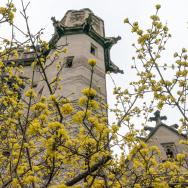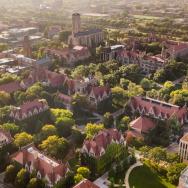Five members of the University of Chicago faculty have been elected to the American Academy of Arts and Sciences, one of the nation’s oldest and most prestigious honorary societies.
They include Profs. Michael J. Franklin, Chang-Tai Hsieh, Magne Mogstad, Salikoko S. Mufwene and Shigehiro Oishi.
These scholars have made breakthroughs in fields ranging from computer science to economics to the evolution of language. They join the 2023 class of 269 people, announced April 19, which includes artists, scholars, scientists, and leaders in the public, nonprofit and private sectors.
Michael J. Franklin is the inaugural holder of the Liew Family Chair of Computer Science. An authority on databases, data analytics, data management and distributed systems, he also serves as Senior Advisor to the Provost on Computation and Data Science and is Faculty Co-Director of the Data Science Institute.
He is one of the original creators of Apache Spark, a leading open source platform for data analytics and machine learning that was developed at the lab. In addition to his academic work, Franklin founded and was chief technology officer of Truviso, a data analytics company acquired by Cisco Systems. He currently serves as a technical advisor to various data-driven technology companies and organizations, including AMPLab spin-out Databricks and Chicago-based Ocient.
He is a fellow of the Association for Computing Machinery and a two-time recipient of the ACM Special Interest Group on Management of Data Test of Time award and numerous Best Paper awards at leading systems and database conferences.
Chang-Tai Hsieh is the Phyllis and Irwin Winkelried Professor of Economics at Chicago Booth. He conducts research on growth and development.
His published papers include “The Life-Cycle of Plants in India and Mexico,” in the Quarterly Journal of Economics; "Misallocation and Manufacturing TFP in China and India," in the Quarterly Journal of Economics; "Relative Prices and Relative Prosperity," in the American Economic Review; "Can Free Entry be Inefficient? Fixed Commissions and Social Waste in the Real Estate Industry," in the Journal of Political Economy; "What Explains the Industrial Revolution in East Asia? Evidence from the Factor Markets," in the American Economic Review; “The Allocation of Talent and US Economic Growth,” in Econometrica; “How Destructive is Innovation?” in Econometrica; and “Special Deals with Chinese Characteristics,” in the NBER Macroeconomics Annual.
Hsieh has been a visiting scholar at the Federal Reserve Banks of San Francisco, New York, and Minneapolis, as well as the World Bank's Development Economics Group and the Economic Planning Agency in Japan. He is a research associate for the National Bureau of Economic Research, a senior fellow at the Bureau for Research in Economic Analysis of Development, and a member of the Steering Group of the International Growth Center in London. He is the recipient of an Alfred P. Sloan Foundation Research Fellowship, a fellow of the Econometric Society, an elected member of Academia Sinica and a two-time recipient of the Sun Ye-Fang Prize.
Magne Mogstad is the Gary S. Becker Distinguished Service Professor in the Kenneth C. Griffin Department of Economics and the College. His work combines economic theory, statistical methods and micro data to help understand the sources of inequality, the functioning of the labor market, and the effects of policy.
Mogstad has published extensively in the leading scholarly journals in economics. He is the lead editor of the Journal of Political Economy, a fellow of the Society of Labor Economists, International Association of Applied Econometrics, and the Econometric Society, and the recipient of the Alfred P. Sloan Foundation Fellowship, the Sherwin Rosen Prize, and the IZA Young Labor Economist award.
Salikoko S. Mufwene is the Edward Carson Waller Distinguished Service Professor in the Department of Linguistics, Race, Diaspora, & Indigeneity, and the College. Mufwene is one of the leading names in the world on the emergence of creoles and on globalization and language.
His current research centers on evolutionary linguistics, which he approaches from an ecological perspective. He focuses on the phylogenetic emergence of language and how languages have been affected by colonization and worldwide globalization, particularly through the indigenization and speciation of European languages in the colonies.
Among his many honors, Mufwene received fellowships at the Linguistic Society of America (2018) and the Institute for Advanced Study in Lyon (2010-11) and was awarded a médaille du Collège de France in 2003. His first and seminal book, “The Ecology of Language Evolution,” has been translated into Mandarin. He is the founding editor of the book series “Cambridge Approaches to Language Contact” (since 2001). One of his latest publications is the two-volume “Cambridge Handbook of Language Contact” (June 2022), the first of which is devoted to the role of population movement and contact as actuators language change.
He was elected to the American Philosophical Society in May 2022.
Shigehiro Oishi is the Marshall Field IV Professor of Psychology. His research focuses on culture, social ecology, and well-being. The Oishi Lab asks questions surrounding the concept of well-being (e.g. "what is a good life?"), the predictors of well-being (e.g. "what are the predictors of a good life?") and the consequences of well-being (e.g. "are there benefits to a happy/meaningful/psychologically rich life?").
Oishi also is interested in how the concepts, the predictors, and the consequences of well-being might differ across cultures. Additionally, his research explores socio-ecological conditions that are detrimental or conducive to well-being, including income inequality, residential mobility, walkability.
Oishi has been awarded the 2017 Society of Experimental Social Psychology Career Trajectory Award, the 2018 Carol and Ed Diener Award from the Society for Personality and Social Psychology, and the 2021 Outstanding Achievement Award for Advancing Cultural Psychology.












 —Prof. Kunle Odunsi
—Prof. Kunle Odunsi
